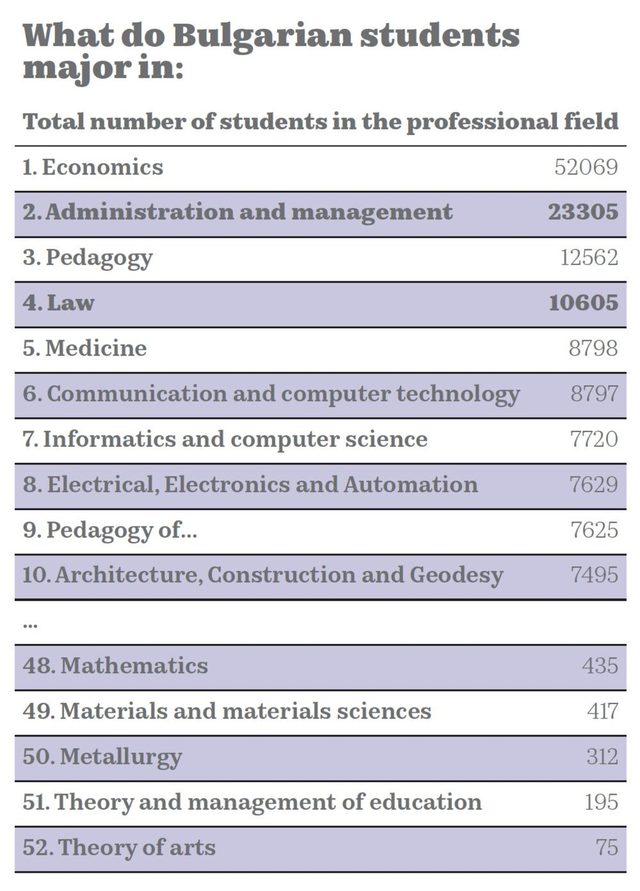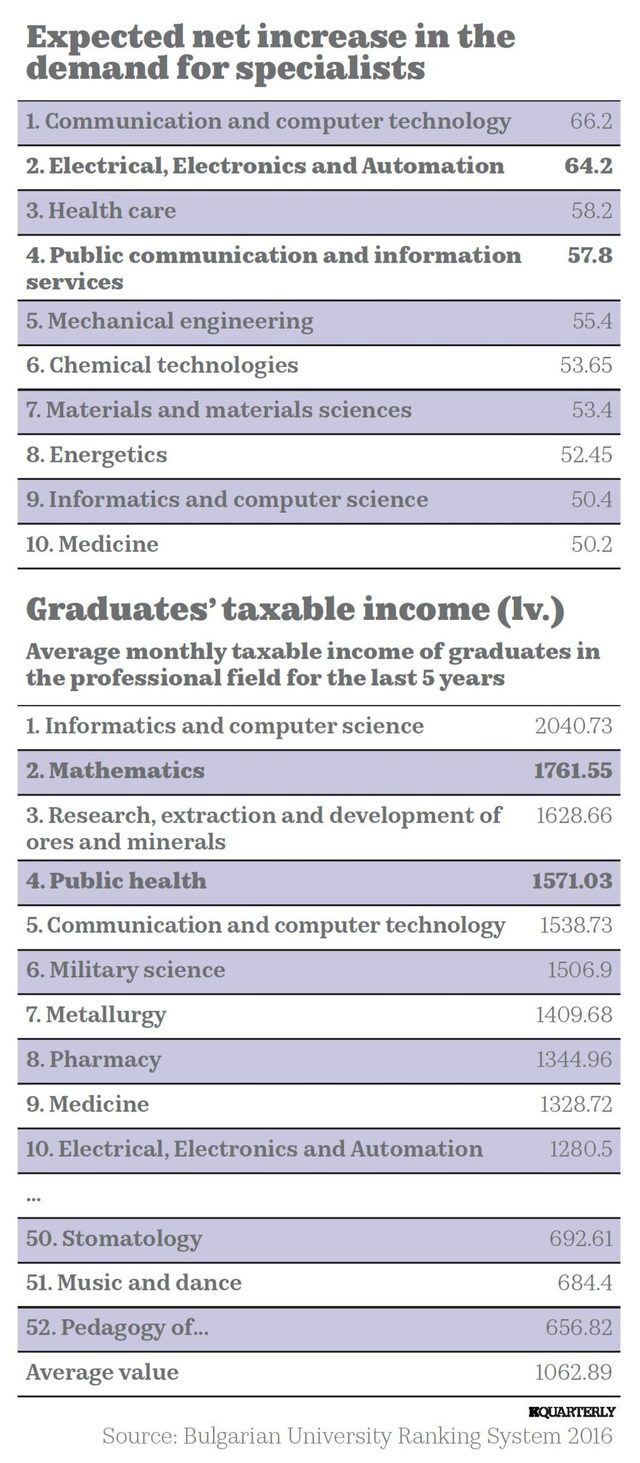Quality is not the first word that comes to mind to describe the Bulgarian higher education system. Most of the 51 universities and colleges are more likely to make the news with their internal intrigues rather than with educational and scientific results. Students often don't know what to expect from their university majors and the choice of a subject is not always a conscious one. The business rarely interacts with the academia and some university programs have not been changed in the past 20 years.
The quality of university education is now one of the most serious impediments to the economic growth of the country and hampers new investments. Companies that seek to attract real talent fight for the few well prepared graduates who chose to stay in Bulgaria.
Despite the bad image, there are some bright spots as the annual university ranking system shows. The ranking compares multiple factors - from teaching facilities to career of graduates. It is a good guidance for prospective students in their choice of a university and shows which university majors correspond to the needs of the labour market.
The latest edition of the ranking system, which was presented in December, proves that university graduates are far more likely to find a job and have higher income. According to the system the earnings of university graduates in Bulgaria increased slightly last year. There are also some reasons to be optimistic regarding the students' choice - economics majors still prevail, but more students choose to graduate in professional fields that are hungry for more employees.

These positive trends cannot compensate for some long-known defects of the Bulgarian higher education system. For example, during the first five years after graduation half of the graduates work on positions that require lower qualification. Some universities and colleges have begun teaching majors only in order to get more students - and more funding - but without having the necessary teaching capacity. Therefore if a university is good in one professional field does not necessarily mean that it is good in all its majors.
Preferences shifting
At the moment, 30% of all students in Bulgaria - or 75,374 students - are studying majors from only two professional fields - administration and management, and economics. These are still the most desired future jobs according to the students' choice, but there has been a decrease in the number of students in both fields in recent years. Law is no more the third most desired professional field, displaced by pedagogy. A possible explanation for the 10% increase in the number of pedagogy students could be the fact that the government has prioritized the professional field (with financial incentives for universities and students) after realizing that the majority of Bulgarian school teachers will retire in the near future.
In 2016, there has been an increase in the number of students in the highest-paying professional fields where there is a shortage of workforce, such as informatics and computer science. The most significant growth in the number of students, however, has been recorded in medicine - by nearly 50% compared to 2013. There are several reasons for this: the high number of foreign medical students, the fact that Sofia University St. Kliment Ohridski recently added medicine to its degree programs, as well as the good opportunities for medical graduates abroad.

It is still early to say whether this reorientation is sustainable and a result of a conscious choice by the students or it is influenced by policy decisions of the universities and the government. But if the trend is maintained it could change the structure of the Bulgarian higher education to better meet the needs of the labor market.
Still missing
"The need of the IT industry for workforce is still greater than the number of graduates in this field", says Diana Stefanova, managing director of the VMware development centers in Bulgaria, Europe, Middle East and Africa. A few years ago the rapidly evolving IT industry was the first sector of the economy to push for reforms in education so that better prepared people enter the labor market.
Although there has been a positive trend in the number of students in informatics and computer science, the companies still face another big issue - the teaching programs and facilities in a lot of Bulgarian universities and colleges are not up-to-date and do not prepare the students for the jobs of the 21st century. This is one of the reasons why many private companies and even professionals acting on their own have established their IT academies. "The problem is that more and more university graduates are not sufficiently prepared for the requirements of the business - they have theoretical knowledge but no contact to the practical side of the job", says Mariana Dobreva, HR manager of Elkabel.
Mathematics is another professional field neglected by prospective students. Although mathematics graduates receive the second highest income in Bulgaria - after their colleagues in informatics and computer science - only 435 students study mathematics at the moment. Maybe the most serious problem with mathematics comes from school education. In recent years, Bulgarian schools often fail to give their pupils quality teaching in mathematics and this results in lower interest at university majors in this subject.
Where education meets business
More attention to school education could actually result in wiser university choices and better answering the needs of businesses. "It seems to me that employers and universities are still not active enough in their communication with high school students," says Georgi Stoychev, executive director of Open Society Institute - Sofia. The institute is part of the consortium developing the university ranking system. In Stoychev's opinion, it is crucial for the government to continue its policy of binding the funding for public universities to the success of their graduates on the labor market as well as boosting opportunities for informed choices by students.
The business sector could also play an important role with offering practical training for students. Representatives of the Technical University in Sofia are certain that "the earlier the contact between students and the business, the greater the guarantee that they will quickly find a job in their field of studies".

Quality is not the first word that comes to mind to describe the Bulgarian higher education system. Most of the 51 universities and colleges are more likely to make the news with their internal intrigues rather than with educational and scientific results. Students often don't know what to expect from their university majors and the choice of a subject is not always a conscious one. The business rarely interacts with the academia and some university programs have not been changed in the past 20 years.
The quality of university education is now one of the most serious impediments to the economic growth of the country and hampers new investments. Companies that seek to attract real talent fight for the few well prepared graduates who chose to stay in Bulgaria.











